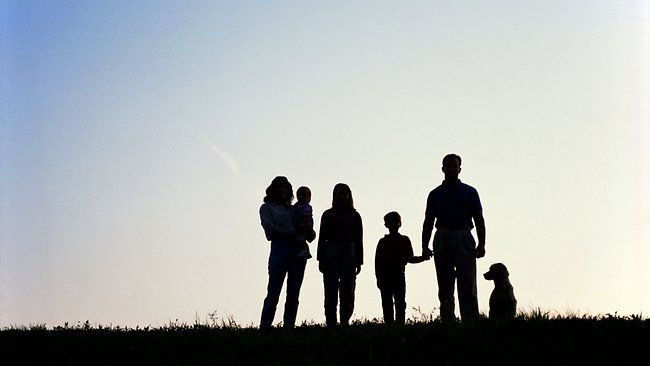Taking Charge of Sex Ed for Your Child
- By Jon Hagen
- •
- 01 Aug, 2019
Push Through the Awkwardness. Your Child Will be Grateful.

I’ve written before about growing up in a small farm town in central Iowa. In many ways it was the perfect place for a child to develop. Most people in town knew each other, very few homes had fencing on their property, so as kids we could run all day from yard to yard, block to block, all across town without any real concerns.
It was shocking then, when I was roughly in the tenth or eleventh grade, to be walking home from school after basketball practice when that idyllic façade came down. It’s an eleven-block walk from the high school building to the home where our family lived. For reasons I don’t remember, my parents were out of town that day. That left just my younger sister and me home alone.
About half-way home that day, as I was approaching an intersection, a car I didn’t recognize pulled up to the stop sign. The man driving the car opened his door and whistled at me. I glanced, unsure of what was happening, and now a bit unnerved, I began walking at a quicker pace. Two blocks later, the same car pulled up to that corner’s stop sign, and the man repeated his actions. Open door, look at me, whistle. Once I had passed through the intersection, I started running. Running as fast as I could without looking back.
Three blocks south of our house there’s a park. The first two blocks northward from the park are up a small hill. By the time I got to within a block of home I was gassed and my lungs were on fire. But I was too freaked to stop. I ran into our house, panicked, but no one was home. I grabbed the family car keys, got in our car, and went jetting back to the high school. I remember thinking I wanted to create a posse of cars manned with basketball players who would spread out across town to try to find that guy. My memory is fuzzy at this point; I think there were only a couple guys left in the locker room, and we just talked it out. I made a few extra turns on the way back home thinking I might run into him. It never occurred to me what any of us might do if we actually found the guy—which we never did.
That’s as close as I’ve ever come to being a victim of sexual assault. Which isn’t much at all compared to many of the stories I’ve heard from clients over the years. But my brief encounter with that stranger gave me a taste of the fear and trauma that people experience more deeply who have been sexually assaulted.
As a result, when my two sons were growing up, my wife and I were determined to educate them as best we could regarding the way Christian Scripture speaks to the care and respect humans should have for their and others’ bodies. I did the research, and settled on a sex ed curriculum created by Stan and Brenna Jones. It’s not the only good curriculum out there; it’s just the one we settled on.
Unlike my case, the sad and maddening reality is that the largest group of potential sex offenders to your children are the people you are the closest to yet least suspecting. Statistically speaking, the group consists of people such as a parent, an older sibling, an extended family member, a babysitter, a neighbor across the street, a youth worker at church, a fellow playmate of the same age who’s been exposed to porn or who’s been violated from a family you know and trust.
Is makes sense, then, doesn’t it, to be taking charge of sex ed with your kids? Because if you don’t, you’re leaving your children at even greater risk of exploitation than is already the case. Meaning that your options are to either live in constant fear and try to create a sanitized bubble around your kids, or leave it to your kids’ school or culture to educate them.
I clearly remember our boys coming home with sex ed permission slips each year of middle school. Each year we refused. Each year our boys sat out of that class, along with only one other boy. And each year our boys would come home after school that week shaking their heads at how far behind their peers were from where we were in our family conversations regarding sex ed.
I’m not saying my wife and I are stellar examples in this area of parenting. I am saying we did something, and that’s better than nothing. We had many awkward moments over the years working through the various stages of sexual maturity. One of my sons was precocious and asked all manner of questions that sometimes made me uncomfortable; my other son was so reluctant about the topic of sex ed that he would ask if he really had to say the “P” word out loud when referring to his own body parts.
Here’s the thing: it’s simply not possible to eliminate all risk to a child from being sexually assaulted. But we can reduce the risk by educating and empowering our children to be aware of who they are in God’s eyes, by creating a safe environment at home, by giving them skills to handle sexualized situations, and by giving them the permission and freedom to speak to their experiences with the assurance we will listen to and value what they have to say.
If you’re the parent of young children (or pass this along to someone you know who is), start talking about sex ed when your kids are young, around age 4 or 5. Begin with a book like God Made All of Me, or The Story of Me. Then build on that. If you need some confidence as a parent to jump in, then go through How & When to Tell Your Kids About Sex. Take the long approach that you’re going to be talking about sex as much you talk about things like money—not as a one-off topic but as an ongoing topic of conversation that’s age-appropriate and graduates up so that by the time they leave your house there’s very little they don’t know short of the experience of it. Don’t make the conversations weird; make them regular, safe, and God-honoring.
Because to Jesus our body is as sacred as our soul.








